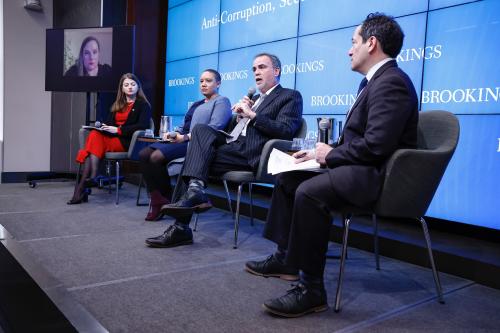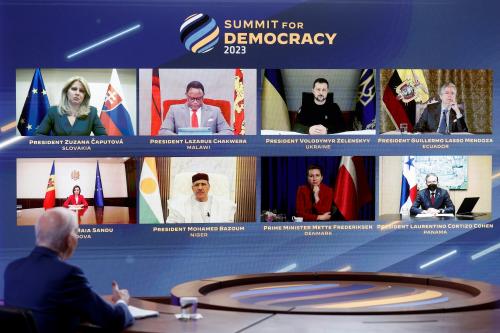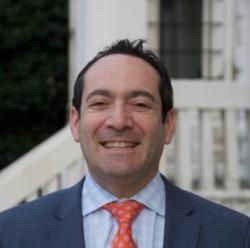Democracy is on the line globally in 2024. Autocrats and malign actors are wielding corruption strategically, closing civic space, curtailing freedoms, targeting political opposition and independent media, and pedaling dangerous disinformation to relentlessly advance illiberalism. The recent murder of political opposition leader and anti-corruption activist Alexei Navalny by Putin’s Russia is a stark reminder of these threats. On top of these challenges, we see emerging threats posed by generative artificial intelligence (AI) and its impact on elections from Slovakia to Taiwan to recently in Pakistan and Indonesia.
The third Summit for Democracy (S4D3) in March must turn the tide on autocratic inroads by leveraging anti-corruption tools to strengthen resilience and take measurable steps to prevent democratic backsliding. We should not compromise on protecting democracy as billions of voters go to the polls around the world, including in the United States and other leading democracies, in 2024. We must elevate the pivotal role of young people who demand honest government and who will hopefully vote in substantial numbers to ensure their democratic futures.
At this critical juncture, S4D3, hosted by South Korea, will bring together democracies, civil society, and key stakeholders to address the confluence of youth participation and these present and future democratic issues. The survival of liberal democracy hangs in the balance in 2024, and younger generations can tip the scales, depending on if their concerns are adequately heard and addressed.
That is where the fight against corruption comes in. Any realistic chance to globally galvanize youth for a democratic future requires tackling corruption’s devastating impact on the next generation, and indeed on all generations. South Korea’s focus on the nexus of democracy and youth at S4D3 is an opportunity for the international community and key stakeholders to invest in the next generation’s surging democratic energy. This summit allows us to globally buttress good governance, rule of law, and anti-corruption efforts.
For South Korea, S4D3 presents a unique opportunity to solidify and further build on its regional and global leadership in advancing democracy, transparency, and accountability. South Korea hosted the 19th International Anti-Corruption Conference (IACC) and co-hosted the second Summit for Democracy (S4D2). As co-host, South Korea organized the Indo-Pacific Regional meeting on “Challenges and Progress in Addressing Corruption,” which culminated in the Seoul Declaration, a recommitment to cooperation on combating corruption.
Seoul also foreshadowed S4D3’s youth-centric theme with a “Youth Resilience against Corruption” side event where young adults led discussions on innovative anti-corruption strategies. Through commitments, progress, and tangible actions, reflected by the country’s improvement on Transparency International’s (TI) 2023 Corruption Perceptions Index (CPI) for the Asia Pacific region, South Korea is raising the bar on anti-corruption prevention and deterrence. This does not mean South Korea’s corruption challenges are over, but as S4D3 host it can tear down barriers to youth democratic engagement and next-generation anti-corruption efforts and deepen anti-corruption support globally.
South Korean leadership efforts are not alone. The global push to combat corruption has been buoyed, in part, through a vast array of global commitments made by governments at multilateral fora, such as the preceding Summits for Democracy, the IACC, the 2023 Open Government Partnership (OGP) Summit, and the recent 10th session of the Conference of the States Parties (COSP10) to the United Nations Convention against Corruption (UNCAC). Of course, making commitments is one thing, delivering on them is another. That is why the Brookings Institution’s global Anti-Corruption, Democracy and Security (ACDS) project, launched in December, is tracking Summit for Democracy anti-corruption commitments and their implementation in the lead up to S4D3.
The United States, which led the first Summit for Democracy (S4D1) and S4D2, has handed the gavel to South Korea for S4D3 in 2024. With that gavel comes the responsibility to elevate combating corruption as a pillar of S4D3, just as Washington did at both summits in 2021 and 2023. The S4D anti-corruption cohorts, such as the Financial Transparency & Integrity (FTI) cohort, for which the Brookings Institution serves as a civil society co-lead, have continuously championed this fight. They successfully executed the year of action following S4D1 and are poised to expand efforts in Seoul. Losing this momentum in the fight against corruption must not be an option. S4D3 and other multilateral fora must focus on threats to developed and developing democracies, including vulnerable populations such as youth.
Youth threatened by democratic decline and corruption
Democracy is at risk globally and the threat is partly fueled by corruption. According to Freedom House, global freedoms have been declining for 17 consecutive years. In a 2019 Pew survey, a majority of citizens across 27 democratic countries reported dissatisfaction with democracy, pointing to corrupt political elites and an inability of elections to bring meaningful change.
It should be a wakeup call that young people have lower satisfaction in democracy than other generations, based on data from nearly five million respondents in over 160 countries between 1973 and 2000. They question whether democracy can truly deliver for them. In a 2021 OECD country survey, only 37% of young people claim to trust their national government compared to 41% of those between 30 and 49 years old and 46% of those 50 years old and over. When citizens think elected officials abuse their publicly entrusted power for private gain, beliefs that the system is rigged arise. Studies indicate corruption reduces trust and political participation— youth participation in particular.
Corruption also exacerbates issues critical to younger generations. Young people constantly voice anxieties over climate change, wealth inequality, and economic exclusion. However, the corridors of power often respond with “lip service,” partial solutions, and pushback.
In Bangladesh, for example, in 2023, nearly 70% of those between the ages of 18 to 35 considered corruption a main obstacle to their country’s development—an understandable, yet staggering, response considering the 2020 TI Bangladesh report showing over half of funds for Bangladeshi climate-change-mitigation projects were lost to corruption. Moreover, from 2018 to 2020, approximately $8 million for Bangladeshi projects on reforestation and renewable energy development were embezzled. It is not hard to see why youth in Bangladesh are disillusioned. Their country is hard hit by climate change, and the capital, Dhaka, is one of the most polluted cities in the world.
Globally, corruption negatively impacts governments’ ability and willingness to address pressing challenges. The exact cost of corruption is difficult to determine since corrupt actors shun the sunlight. However, roughly trillions of dollars in corruption-related damages unfairly tilt the scales of economic opportunity by diverting needed resources for education, healthcare, and employment.
Youth on the frontlines of the fight for democracy
Young people are the current and next generation of democracy’s defenders. They are active at the forefront of global advocacy and democracy movements. From Hong Kong in 2019 to Iran in 2022 and COP 28 UAE in 2023, youth are diverse and increasingly campaign for action on climate change, gun violence, and corruption. They also play a determinative role in consequential political events including dislodging a government tipping toward illiberalism in Poland’s most recent election and in the close 2020 U.S. presidential election.
Despite clear disillusionment with democracy (and a widespread misconception that they are disinterested in politics), young people are deeply engaged in civic life. Providing increased opportunities, including at S4D3, for youth political participation multiplies global efforts to combat corruption and ensures the next generation flourishes in a secure democratic world.
Rising momentum and deepening challenges
As TI’s recently released CPI 2023 report indicates, momentum is building in the fight against corruption in many jurisdictions, but challenges impede progress. According to some anti-corruption experts, governments’ implementation of commitments is not keeping up with a shifting global landscape. There are also concerns that corrupt actors are adapting and deploying new technologies to overcome safeguards. To reignite action, in December 2023, as part of the 20th anniversary of UNCAC, 160 countries recommitted to fulfilling UNCAC treaty anti-corruption provisions. Open Government Partnership (OGP), a partner in the Brookings ACDS project, is supporting 18 countries to implement their commitments through OGP action plans, as of June 2023.
To build on this progress toward transparency, accountability, and implementation of anti-corruption commitments, we urge the organizers and participants of S4D3 to consider several actionable recommendations.
1. S4D3 organizers and participants must ensure combating corruption remains a core pillar in the global fight for democracy. Represented governments and key stakeholders at the Summit must cooperate to advance anti-corruption progress made through the first two summits and other international fora.
Stocktaking is important but not enough to meet the tsunami of autocratic activities undermining democracy internationally in 2024. S4D3 must ensure that anti-corruption commitments are kept by governments, and if necessary, recommitments are monitored, implemented, and enforced. There must also be space at the summit for new ideas, collective action, and accountability mechanisms.
2. S4D3 organizers and participants must further harness technology to reduce corruption and enhance democracy. Using technology and digitalization to strengthen democracy, modernize government, and combat corruption is an area in which South Korea has exhibited progress and leadership.
The private sector, engaged with governments and civil society, is developing cutting-edge technologies to expose and inhibit corrupt behavior. For example, AI and e-governance services safeguard public funds, track illicit financial flows, and detect fraudulent activity. Enhanced open government platforms, including e-procurement systems, like Ukraine’s ProZorro, promote collaboration and trust between citizens and government. In addition to delivering essential resources to the public and greater transparency, digitalization and use of technology further enables governments, at local and national levels, to reach, relate to, and integrate the views of digitally native youth.
3. S4D3 and its participants must further deepen the role of civil society organizations (CSOs), free media, private sector, and youth in and beyond the Summit process. As watchdogs and leading advocates of democracy, transparency, and accountability, CSOs and free media are integral to exposing corruption and holding bad actors accountable. Their critical efforts to strengthen democracy and combat corruption are jeopardized by increasingly numerous and hostile malign actors, like China and Russia.
Democracies at S4D3, especially donors, must invest more in frontline democracy defenders, civil society, independent media, and youth. A report by the National Endowment for Democracies rightly urges donors to commit additional resources to sustain press freedom. S4D participants, including S4D3 host South Korea, must offer increased technical assistance to countries seeking to advance key reforms at the national and local levels but lack the expertise to do so. USAID’s Financial Transparency and Accountability Accelerator, launched after S4D2, is a powerful example of providing needed support to countries committed to rooting out kleptocracy and transnational corruption.
4. S4D3 participants should invest in the creation of a youth-centric indicator for measuring corruption. Ensuring sustainable youth engagement in the fight for democracy requires ongoing consideration of the impacts of corruption on youth. Measuring this impact will enhance clarity around trends and gaps in anti-corruption policies and priorities.
Recently at COSP10, the UNODC released a statistical corruption framework that offers a common set of definitions, indicators, and guidance on collecting and analyzing data. It underscores the need for a gender perspective. The same can be said for other vulnerable cross-cutting populations like youth. A specific measurement and analysis framework can be utilized for formulating youth-specific standards or youth-inclusive guidelines for policymaking.
Conclusion
Democracy is on the ballot in 2024 and the stakes could not be higher. Enemies of democracy are leveraging dysfunction, inaction, and autocratic enablers—so called “useful idiots”—to advance their interests. Russia’s Putin, China’s Xi, Kim Jong-Un, and others are pulling straight from the autocratic playbook. Our response requires urgent action and immediate multigenerational cooperation. If we want to ensure a sustainable long-term offensive against autocrats and corrupt actors, the democracy baton must be passed to youth, including at next month’s Summit for Democracy.
Democratic defenders must come together at S4D3 to show unity, force stakeholders to act, and make 2024 a year of democratic action. While momentum is strong, key anti-corruption commitments are essential to ensuring democratic resilience. Countering corruption at S4D3 is paramount to restore trust in and defend our threatened democracies.
-
Acknowledgements and disclosures
The authors would like to thank Cheri-Leigh Erasmus, Corina Rebegea, and Andrew Yeo for their thorough review of the article, as well as Lily Conway, Caroline Cornett, and Claire Tempelman for assistance with fact-checking and background research.
The Brookings Institution is committed to quality, independence, and impact.
We are supported by a diverse array of funders. In line with our values and policies, each Brookings publication represents the sole views of its author(s).













Commentary
Anti-corruption progress at the Summit for Democracy is essential to safeguarding democracy
March 6, 2024